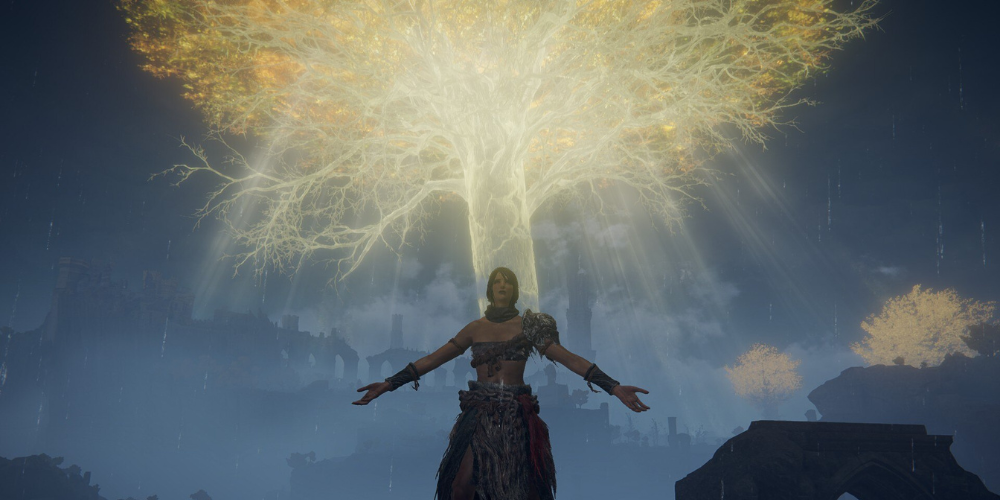The Emergence of Solo Sagas: Decoding the Success of Elden Ring and God of War

In an age where multiplayer games like Fortnite and Apex Legends dominate headlines with their competitive and social dynamics, the monumental success of single-player experiences such as Elden Ring and God of War marks a significant trend in the gaming industry. These narrative-driven adventures have not only garnered critical acclaim but have also achieved a commercial triumph, signaling a robust appetite among gamers for rich, solitary experiences. The rise of these single-player epics illuminates a clear message about player preferences: there is a deep-seated desire for immersive storytelling, sophisticated world-building, and the emotional depth that these games deliver.
The gaming community's embrace of these titles reflects a yearning for a return to the roots of gaming, where the journey of a solitary hero through meticulously crafted worlds captivated players’ imaginations. Elden Ring and God of War have tapped into this sentiment, offering expansive universes to explore, complex characters to understand, and intricate plots to unravel. These games stand as testaments to the fact that despite the allure of online competition, the draw of a well-told story in an interactive medium remains undiminished.
The Lure of the Lore: Crafting Compelling Worlds

Elden Ring and God of War exemplify the power of lore in creating a compelling gaming experience. Their intricately designed worlds, steeped in mythology and mystery, invite players to lose themselves in realms that feel alive and teeming with secrets. The narrative depth in these games is not merely a backdrop but an essential element of the gameplay, encouraging exploration and engagement with the environment. This richness of lore creates a sense of wonder and discovery, as every location, character, and item can reveal a fragment of the larger tapestry that makes up the game's universe.
This attention to world-building is a crucial aspect of what makes single-player epics resonate with players. In Elden Ring, the collaboration with fantasy novelist George R.R. Martin in crafting the game's mythos added layers of complexity and history that players could delve into, creating a sense of a world that extends beyond the player's immediate experience. Similarly, God of War's reimagining of Norse mythology intertwines the personal story of Kratos and his son Atreus with the epic scale of the gods' machinations, rendering a narrative that feels both intimate and grandiose. It is this marriage of personal storytelling and epic myth-making that captivates players, granting them a role in stories of monumental scale.
The Art of Mastery: Gameplay that Rewards Skill and Patience

Central to the appeal of games like Elden Ring and God of War is their gameplay mechanics, which prioritize skill, strategy, and patience. These games challenge players to master complex combat systems, learn enemy patterns, and perfect their approach to obstacles. This focus on mastery through practice stands in stark contrast to many multiplayer games that often rely on quick reflexes or the randomness of match-making. In single-player epics, the sense of progression and accomplishment stems from the player's personal improvement and their growing understanding of the game's mechanics.
The satisfaction derived from overcoming difficult challenges in these games fosters a sense of personal achievement unmatched by many other gaming experiences. As players progress in Elden Ring, they encounter a variety of enemies and bosses, each requiring a unique strategy to defeat. The game’s open-world design allows for a non-linear approach, enabling players to explore at their own pace and tackle challenges as they see fit. Similarly, God of War’s combat system, with its mix of melee and magical abilities, rewards players who take the time to learn its intricacies and leverage them in the heat of battle. This depth of gameplay ensures that victories feel earned, and the journey through these epic narratives becomes all the more satisfying.
The Solitary Connection: Single-Player Games and Emotional Investment

The resurgence of single-player epics highlights another critical aspect of player preferences: the desire for emotional investment. Games like Elden Ring and God of War offer not just challenging gameplay or rich worlds to explore but also stories that evoke a wide range of emotions. By centering on a singular protagonist or a small cast of characters, these games allow for a deeper connection between the player and the characters they inhabit or interact with. This connection is forged through hours of gameplay, during which players become invested in the fates of these virtual personas.
The emotional journey in these titles is often a solitary one, with the player facing the trials and tribulations of the narrative alone. This solitude amplifies the impact of the story's emotional beats, as players fully immerse themselves in the protagonist's role without the distraction of other players' experiences or objectives. In God of War, the evolving relationship between Kratos and Atreus is a driving force of the narrative, and players are privy to every nuance of their interactions, making the emotional stakes feel intensely personal. Elden Ring, while offering less direct storytelling, still manages to evoke a sense of loneliness and determination as players navigate its vast and often foreboding landscapes. It is this emotional resonance that elevates the single-player experience, making these games not just entertaining but also profoundly moving.
In conclusion, the meteoric rise of single-player epics like Elden Ring and God of War is a testament to the enduring power of narrative, world-building, skillful gameplay, and emotional storytelling in video games. These elements combine to create experiences that resonate deeply with players, offering an escape into worlds that are as rich and complex as any found in literature or film. As the gaming industry continues to evolve, the success of these titles ensures that the single-player epic will remain a vital and cherished component of the gaming landscape, satisfying the desires of players who seek solace and grandeur in their digital adventures.
















